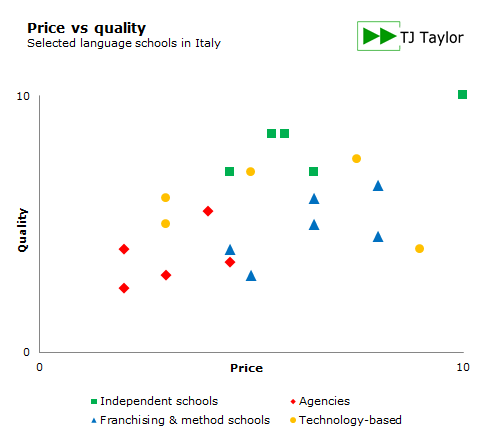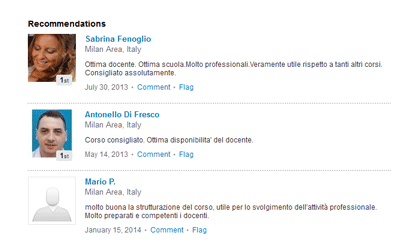When it seems that there are 100s of language schools, it is difficult to understand the differences and make the right choice.
In reality, however, there are 4 different types of school, and each type has distinct characteristics, advantages and disadvantages. These 4 categories are:
- franchising & method schools
- independent schools
- agencies
- technology-based companies
Some examples from Italy, and specifically around Milan:
| Independent schools | Agencies ** | Franchising & method schools | Technology-based |
|---|---|---|---|
Linguarama |
Connor |
Wall Street Institute |
GoFluent |
* The British Council is actually a government-backed organisation, but shares more characteristics with this category of school than any other. Not to be confused with the British Institutes, the British Schools, or the British Institute of Florence, all of which sometimes just use the first word.
** An agency is focussed on sales and their margins. They use outsourcing or freelancers who are loosely coordinated and receive little-to-no training, so there is not a stable core of teachers.
Why is this important?
Each category of school has a set of common characteristics – all the schools in each category share the same advantages and disadvantages.
In Italy there are 1,722 language schools, of which 1,318 are franchisees of 11 different franchiser brands, 44 are technology-based, and 359 are agencies or independent schools.
* Source: 2017 directory & Federlingue
If you understand what these are, you can cut through the marketing fog, ask the right questions, and find the best school for you and your company's needs more quickly.
You will:
- avoid wasting time with schools that don't align well with your priorities
- be able to create a shortlist more easily and quickly
- make a better choice by avoiding unnecessary trade-offs caused by a shortlist stretching across different categories
Also, if you're changing the language school you work with or looking for a new supplier, you will avoid other similar schools that will probably give you the same unsatisfactory service.
This guide will help you understand the main differences, including differences in prices, teachers and quality.
What are the differences?
The following table is a description of the typical characteristics and priorities of the schools in each category, focussing on the positives so the comparison is more objective:
| Independent schools | Agencies | Franchising & method schools | Technology-based |
|---|---|---|---|
Priority is quality |
Priority is cost |
Priority is volume |
Priority is efficiency |
| Experienced teachers Personalisation of courses and content Customer service Range of services |
Low cost Range of services |
Geographic coverage Brand awareness Consistency Large capacity |
Geographic coverage Flexible Customer service |
The table above generalises the main differences of course, but by drawing out common themes we can understand more clearly the main advantages (and disadvantages) of each type of school.
Let's look at 3 of the most important differences - prices, geographical coverage, and teacher quality – as well as the role of reviews and some key questions to ask.
Prices
Pricing and cost are obviously a part of your decision process, and without a clear understanding of the differences between the schools, it might seem the easiest way to choose.

"Prices are not a reliable indicator of quality, especially for franchising and technology-based schools, because of high marketing expenses and royalties."
If you're buying a product, a higher price normally indicates higher quality, and vice versa.
However, for services such as language training this is not always true, and prices are often an unreliable indicator of quality.
This is especially true in the franchising sector and for technology-based companies, whose prices normally range from medium to high, because of high marketing expenses, royalties and/or fixed costs.
For franchise schools it depends mostly on how much independence each franchisee has from the franchiser or central policy.
For technology-based schools it depends on how they structure the teachers' involvement in the courses, and how technology is used - whether to substitute or to enhance the learning experience.
Agencies are normally the cheapest providers, due to their business model, with independent schools at a range of different price levels, from low to high but mostly around mid-market (€40-50 per hour).
Geographical coverage
Geographical coverage is traditionally the strong selling point of franchise schools, who for example in Italy have between 7 and 120 franchisee schools.
However, this advantage is more true if you want courses in a school rather than at your company's offices.
"Most agencies and many independent schools also deliver courses in various other cities at their clients' offices."
Most agencies and many independent schools also offer courses in-company at various locations outside the city they are located in – some have a more established and wider network of teachers than others, or advertise it more transparently, with some referring to 'a presence' instead of an office.
This is because franchise schools increasingly use independent or freelance teachers, who also work with other agencies and independent schools in other cities.
If you are looking at telephone, blended or online courses, however, all technology-based companies, most franchises and agencies, and some independent schools offer these types of courses, which naturally have no geographical limits.
Teachers and quality

The teacher is key to a successful course, and this is also the biggest difference between the 4 categories of language school.
The websites of many schools have an identical description of their teachers – experienced native English speakers with a degree and a teaching qualification. But this covers over large differences in staff turnover and teaching experience.
It's important to check the meaning of a 'teaching qualification'. Some schools accept elearning courses that last 5-25 hours, or offer 1 day 'teacher training' courses to new hires who have never taught before, rather than requiring a recognised or reliable qualification.
"Verify the quality of their teachers by checking postings on the job boards or their careers page."
The best way to verify the quality of their teachers is to check the job requirements on the school's careers page or their postings on the job boards.
Method schools and franchises normally rely on newly-qualified teachers, as the procedures to follow in the lessons are normally strict and highly prescriptive, so teaching experience is not even needed. However, the less prescriptive the method, the more experienced the teachers - normally.
In fact, most teachers start their careers at method and franchise schools, to gain experience and confidence, before moving on to an independent or technology-focussed school. This is 1 of the 2 main reasons why method schools and agencies have a higher level of teacher turnover.
Agencies work with various types of teacher, at various levels of experience and qualifications, all depending on cost and the pricing strategy they apply to clients.
"Independent schools normally have more experienced teachers."
Independent schools normally hire more experienced teachers because of the level of personalisation, didactic responsibility and a focus on teaching quality.
Some technology-based courses have a large teacher component, but others are elearning-focussed, with various levels of teacher quality - some with geographically distributed teachers and others who off-shore most of their teachers to a call centre.
B2B or B2C or both?

Which types of customers a school serves will influence the type of service you receive.
Most schools focus mainly on the consumer market, which is reflected in their marketing campaigns, the number of locations they have, and the standardisation of their courses.
"This influences the courses they offer and the types of teacher they hire."
This means that corporate courses are normally a secondary offering, and so this influences the courses they offer and the types of teacher they hire.
Some schools focus mainly (or exclusively) on the corporate market, which is reflected in the structure and location of their offices, the background of their teachers, and their approach to designing courses.
References and reviews

References from other clients and word-of-mouth are invaluable in creating a shortlist, but they are normally limited to their own experiences with perhaps 2-4 schools.
Also, their company's priorities are probably not the same as yours.
Larger schools normally have reviews written by previous students or testimonials either on their website or on a third party website such as Google Local or Yelp. However, these reviews are normally from private individuals rather than companies.
3 key questions to ask
When you are researching language schools online it can be difficult to separate the marketing from the important information. If the school is not one of those listed above, or if you're narrowing down a shortlist, these 3 questions will help:
- Who are your main competitors?
This question will help you understand what type of school you are talking with, and how they view themselves, so you can understand which of the characteristics above apply. - What is the average age of your teachers? And what is your rate of teacher turnover?
This is the most reliable indicator of the quality of a school's teaching staff. It's important to understand if most of the teachers are freelance, or if there is a stable core of long-term, experienced teachers. - Can you show me some of the materials you use for customised courses? How do you customise courses?
If personalised courses are important to you, this will show you the level of professionalism of the teachers and the account managers, and their understanding of course design.
Choosing the best school for your priorities
If you want good teachers and quality at a reasonable cost = independent schools
If you have various needs and low cost is key = agencies
If you need to cover many locations with a physical presence = franchising & method schools
If you need flexible courses with good customer service = technology-based schools
Sources: reports and data from Federlingue, Plimsoll, IATEFL, Fondir, TESOL, the Yellow Pages, Google reviews, school websites, and feedback from teachers and clients. All trademarks are the property of their respective owners. This is not comparative advertising or intended to compare us with any other school.
Questions?
For any questions or clarifications call us on +39 02 4300 19075 or send us an email, with no obligation:



